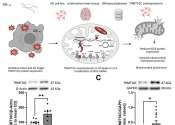Ageing (British English) or aging (American and Canadian English) is the accumulation of changes in an organism or object over time. Ageing in humans refers to a multidimensional process of physical, psychological, and social change. Some dimensions of ageing grow and expand over time, while others decline. Reaction time, for example, may slow with age, while knowledge of world events and wisdom may expand. Research shows that even late in life potential exists for physical, mental, and social growth and development. Ageing is an important part of all human societies reflecting the biological changes that occur, but also reflecting cultural and societal conventions. Age is usually measured in full years — and months for young children. A person's birthday is often an important event. Roughly 100,000 people worldwide die each day of age-related causes.
The term "ageing" is somewhat ambiguous. Distinctions may be made between "universal ageing" (age changes that all people share) and "probabilistic ageing" (age changes that may happen to some, but not all people as they grow older, such as the onset of Type Two diabetes). Chronological ageing, referring to how old a person is, is arguably the most straightforward definition of ageing and may be distinguished from "social ageing" (society's expectations of how people should act as they grow older) and "biological ageing" (an organism's physical state as it ages). There is also a distinction between "proximal ageing" (age-based effects that come about because of factors in the recent past) and "distal ageing" (age-based differences that can be traced back to a cause early in person's life, such as childhood poliomyelitis).
Differences are sometimes made between populations of elderly people. Divisions are sometimes made between the young old (65-74), the middle old (75-84) and the oldest old (those aged 85 and above). However, problematic in this is that chronological age does not correlate perfectly with functional age, i.e. two people may be of the same age, but differ in their mental and physical capacities. Each nation, government and non-government organization has different ways of classifying age.
Population ageing is the increase in the number and proportion of older people in society. Population ageing has three possible causes: migration, longer life expectancy (decreased death rate), and decreased birth rate. Ageing has a significant impact on society. Young people tend to commit most crimes, they are more likely to push for political and social change, to develop and adopt new technologies, and to need education. Older people have different requirements from society and government as opposed to young people, and frequently differing values as well. Older people are also far more likely to vote, and in many countries the young are forbidden from voting. Thus, the aged have comparatively more political influence.









